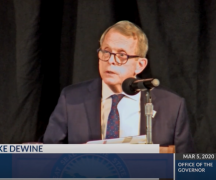It seems as if income inequality would slow the economy. But in a recent survey a big portion of a panel of Ohio economists said that depends.
In the survey of 26 Ohio economists released Monday, 14 agreed that rising inequality in Ohio is slowing economic growth, four disagreed and eight said they were unsure.
By some economic metrics there’s certainly cause to be concerned that a large swathe of Ohioans are so poor that they find it difficult to be productive in the state economy. Consider:
- 29.9% percent of the state’s population was living on wages that were 200% or less of federal poverty guidelines in 2019, or less than $52,000 for a family of four. That means the state was tied with Indiana as the 31st-poorest state by that measure, the Kaiser Family Foundation reported.
- Six of the 10 most common jobs in Ohio pay wages under 130% of individual federal poverty guidelines — less than $18,000 a year, Advocates for Ohio’s Future reported in 2021
- In 2020, 6.53 infants died per every 1,000 live births — tying Ohio with Michigan for 10th-worst state, the U.S. Centers for Disease Control and Prevention reported.
- Earlier this month, a survey by the U.S. Census Bureauestimated that 762,000 Ohioans often or sometimes didn’t get enough to eat over the previous week. Meanwhile, Ohio foodbanks say they’re in danger of running out of food.
- In 2020, 42% of all births in Ohio were financed by Medicaid, the government health program for the poor, KFF reported. That was the 20th-highest rate in the United States.
- Life expectancy at birth in 2020 was 75.3 years in Ohio, the 13th lowest of any state, the CDC reported.
Having so many people living in or near poverty and ill-health can limit economic growth in a lot of ways. For one, they simply have less money to spend on goods and services produced by others, limiting economic activity.
For another, they might lack things like stable housing and transportation that are almost necessary to hold a job. Also, in Ohio people seem to be getting sicker at younger ages than in most other states, limiting their ability to work and participate in the economy.
Most of the economists surveyed agreed that having so many people making so little is holding Ohio back.
“High-income, high-education, high-tax-base areas do well, but at the expense of lower-income, lower-education, lower-tax-base areas and the end result is the state overall is pulled down,” Kevin Egan of the University of Toledo wrote in the comments section of the survey. “Truly we are all in this together as every household is workers, especially investments in children as future workers and Ohio has a child poverty rate of 19% which is double the child poverty rate of some other states. We could choose many efficient and fair policies to reverse this, beginning with reducing child poverty rates.”
Fadhel Kaboub of Denison University agreed that inequality costs everybody.
“The empirical literature is very clear on the negative impact that inequality has on economic growth,” he wrote. “The most impactful pro-growth policies are the ones that invest in education, health, infrastructure, and job creation opportunities for the bottom half of the income ladder.”
As they often do, one economist who said he was uncertain about the impact of inequality on the overall economy wanted clearer definitions.
“My gut says ‘agree’ but I don’t think the evidence is clear,” wrote Paul Holmes of Ashland University. “I think it also depends on what we mean by ‘growth’; (gross domestic product) per capita could be increased by inequality while median household income could be decreased, for example.”
None of the four economists who disagreed that inequality diminishes economic growth furnished an explanation for that view.
More headlines from Ohio Capital Journal:





